Films with the genre "Drama", sorted by rating
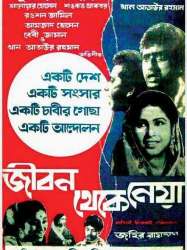
Jibon Theke Neya (1970)
, 1h54Directed by Zahir Raihan
Origin Bangladesh
Genres Drama, Historical
Themes Political films
Actors Abdur Razzak, Shuchanda Akhter, Khan Ataur Rahman, Anwar Hossain, Rawshan Jamil
An autocratic bad tempered woman controls family members-her husband, two brothers and the servants which symbolizes the political dictatorship of Ayub Khan in then East Pakistan. Both stories run in parallel. Outside, the people of East Pakistan(now Bangladesh)rise in political protest, and inside, the family members raise their voices against the tyrannical woman. The two brothers get married and the situation gets more complicated when there are conspiracies for the control of the family between the sister-in-laws by having the keys of the house.
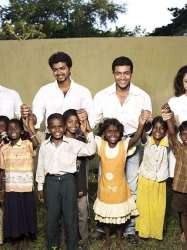
Herova? Zerova? (2008)
, 5minutesGenres Drama, Documentary
Actors Suriya, Vijay, R. Madhavan, Jyothika
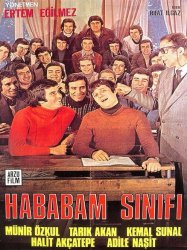
The Chaos Class (1975)
, 1h30Directed by Ertem Eğilmez
Genres Drama, Comedy
Actors Kemal Sunal, Adile Naşit, Şener Şen, Halit Akçatepe, Tarık Akan, Münir Özkul
A group of lazy, ignorant highschool students, in no rush to graduate, have settled into life at their private school, paid by aloof parents, where they have bonded as a family and are cared for by school attendant Hafize Ana who has accepted them as her real sons. Their kingdom over the school is challenged by a new principal who, despite his warm hearted nature, takes on the role of tough disciplinarian and becomes the butt of their tricks and jokes as he prepares them for life.

Pink Floyd: Pulse (1995)
, 2h25Origin United-kingdom
Genres Drama, Documentary, Musical
Themes Films about music and musicians, Documentary films about music and musicians, Documentaire sur une personnalité, Musical films
Témoignage de leur dernière tournée "Division Bell" en 1994, ce concert est une véritable tranche de l'histoire du rock, un moment crucial dans la carrière du groupe. Tourné à Londres au Earl's Court lors d'une des 14 dates, le concert est présenté ici dans son ici dans son intégralité, entièrement remastérisé.
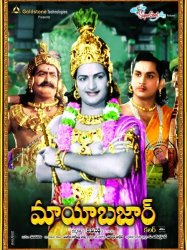
Mayabazar (1957)
, 3h4Directed by Kadiri Venkata Reddy
Genres Drama, Comedy, Fantasy
Themes Films based on mythology, Films about religion
Actors Samarla Venkata Ranga Rao, Kommareddy Savitri, Gemini Ganesan, Akkineni Nageswara Rao, Rushyendramani, Allu Rama Lingiah
Subhadra (the sister of Balarama and Krishna) marries a Pandava named Arjuna, and their son Abhimanyu falls in love with Balarama's daughter, Sasirekha. The families decide to marry them when they reach adulthood. By the time Abhimanyu and Sasirekha grow up, the Pandavas have lost a dice game to the Kauravas due to Sakuni's manipulation. Krishna, furious at an action of Dussasana that has insulted Draupadi, saves Draupadi. Balarama teaches the Kauravas a lesson and later reaches Hastinapuram. Sakuni and Duryodhana respect Balarama; after manipulating him, they seek his favour by requesting that Sasirekha be married to Duryodhana's son Lakshmana Kumara. They intend to force Balarama and Krishna to support them if the Pandavas wage war after their fourteen-year exile. Unaware of this, Balarama accepts.
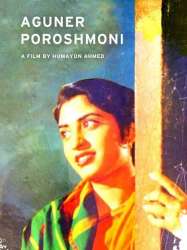
Aguner Poroshmoni (1995)
Directed by Humayun Ahmed
Origin Bangladesh
Genres Drama, War
Actors Asaduzzaman Noor, Bipasha Hayat, Abul Hayat, Dilara Zaman, Doli Johur
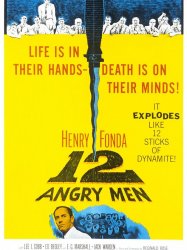
12 Angry Men (1957)
, 1h35Directed by Sidney Lumet
Origin USA
Genres Drama, Crime
Themes Assassinat, L'action se déroule en une journée, Théâtre, Films about capital punishment, Films based on plays
Actors Henry Fonda, Lee J. Cobb, E. G. Marshall, Martin Balsam, Jack Warden, John Fiedler
The story begins in a New York City courtroom, where an 19-year-old boy from a slum is on trial for allegedly stabbing his father to death. Final closing arguments are presented, and the judge then instructs the jury to decide whether the boy is guilty of murder. The judge further informs them that a guilty verdict will be accompanied by a mandatory death sentence.

Sandhesam (1991)
Directed by Sathyan Anthikad
Genres Drama, Comedy
Themes Political films
Actors Sreenivasan, Jayaram, Thilakan, Siddique, Kaviyoor Ponnnamma, Oduvil Unnikrishnan
After his retirement from Indian Railways, as station master, Raghavan Nair (Thilakan) is back at his home. His long cherished dream to spend his retired life along with his family consisting of wife (Kaviyoor Ponnamma), three sons and two daughters gets a blow after seeing his two sons brawling each other over their political differences. Prabhakaran (Sreenivasan), the elder one is a staunch leftist, and an active worker of the Revolutionary Democratic Party (RDP) which has just lost the Kerala state Assembly elections and relinquished office. Prakashan (Jayaram), popularly known as KRP, his younger brother is involved with the Indian National Secular Party (INSP) which has now come to power. Though they are both educated, neither has any plans to earn a living on their own and are fully immersed in petty politics, sponging off their parents for their needs. Raghavan Nair becomes deeply worried about their future, and tries to advise his sons, but of his admonitions fall on deaf ears. Anandan (Mala Aravindan), his son-in-law is a police sub-inspector but is now on suspension. When the RDP was in power, he arrested and beat up several of the opposition party workers on instruction from the ruling party officials. Now that the previous opposition is in power, they exact their revenge, first by transferring him repeatedly to stations as far away from civilisation as is possible, and then by suspending him. As part of his retired life, Raghavan Nair decides to focus his attention on his agricultural activities and meets the new young agricultural officer (Siddique) and, with his wife's approval, wants their younger daughter to get married to him, but his elder sons oppose it on flimsy and petty reasons. Prakashan, whose party is in power, pulls strings and get him transferred immediately to a remote location in order to prevent the marriage but Nair gets them married at the registrar's office. In the meantime, Anandan and his wife, Raghavan Nair's eldest daughter, demand partition of the property and their share, which Raghavan Nair objects to. The last straw is when their mother falls ill and is hospitalised for a day or so, and none of her children bother to show up at the hospital - in particular, the two older sons. Raghavan Nair, when he sees all of them milling around his house on returning from the hospital, loses his temper. He throws out all his children and orders them never to enter his house again. But to his surprise he finds both Prakasan and Prabhakaran at the gate, fully repented. He calls them in and they begin a new life. The film ends by showing Prabhakaran going to court as a lawyer and Prakashan for a job interview.
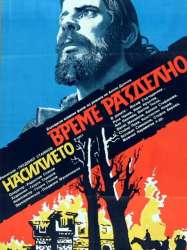
Time of Violence (1988)
, 4h48Directed by Ludmil Staikov
Genres Drama, Historical
Actors Rousy Chanev, Iossif Surchadzhiev, Anya Angelova Pencheva, Konstantin Kotsev, Velko Kanev, Đoko Rosić
Ottoman Empire, 1668. Köprülü Fazıl Ahmed Pasha concentrates his war efforts on the Cretan War, which inspires him to further subdue the Sultan's Christian subjects. One of the targets is Elindenya, a village located in a Rhodope valley where the Christians enjoy a de facto autonomy thanks to the local Muslim overlord Süleyman Agha's rule. A sipahi regiment is dispatched to the valley with the mission of converting the Christian population to Islam, by force if necessary. The extraordinary thing is that the regiment is led by Kara Ibrahim, a devshirme from Elindenya and although Süleyman Agha, feeling that his self-ordained rule is at stake, objects to forced conversions, Kara Ibrahim seems to be in favour of harsh measures against the locals, including his own family.
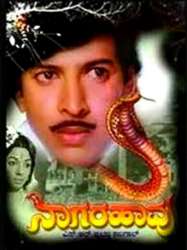
Naagarahaavu (1972)
, 2h49Directed by Puttanna Kanagal
Genres Drama
Actors Vishnuvardhan, Aarathi, K. S. Ashwath, Leelavathi, Shubha, Upendra
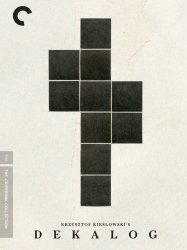
The Decalogue (TV series) (1988)
, 1hDirected by Krzysztof Kieślowski
Origin Pologne
Genres Drama
Themes Films about religion
Actors Krystyna Janda, Artur Barciś, Grażyna Szapołowska
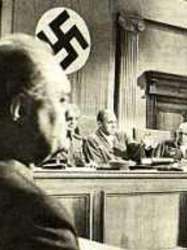
Jeder stirbt für sich allein (1962)
, 1h40Genres Drama
Themes Political films
Actors Edith Schultze-Westrum, Harry Riebauer, Werner Peters, Hugo Schrader, Friedrich Schoenfelder, Rudolf Fernau
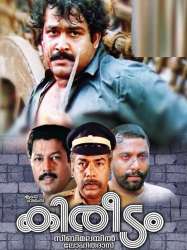
Kireedam (1989)
, 2h20Directed by Sibi Malayil
Genres Drama, Action
Actors Mohanlal, Thilakan, Mohan Raj, Murali, Sreenath, Parvathy
Achuthan Nair (Thilakan), an honest and sincere police constable, has a loving family consisting of his wife Ammu (Kaviyoor Ponnamma), two sons and two daughters. Achuthan Nair wants his elder son Sethumadhavan (Mohanlal) to be a police inspector. He shares a cordial and amiable relation with his son. Sethu is engaged to Devi (Parvathi), the daughter of Krishnan Nair (Sankaradi), his maternal uncle. One day, for charging a petty case against the son of a Member of Legislative Assembly, Achuthan Nair is transferred to Ramapuram police station. The family also shifts to Ramapuram.
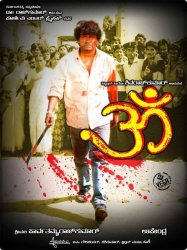
Om (1995)
, 2h30Directed by Upendra
Genres Drama, Crime
Themes Gangster films
Actors Shiva Rajkumar, Prema, Sadhu Kokila, V. Manohar
The movie begins with a reporter writing articles about underworld dons and the reasons why people enter the underworld and practice rowdyism. The movie revolves around the main character Satya (Shivarajkumar), a son of a priest who turns into a rowdy for love. But the same love brings him back into being a civilized person. But there are twists involved in the movie as to why he is provoked to turn into a rowdy, how he is rejected by his family and relatives and also the girl for whom he had to became a rowdy in the first place and many other events which are the key scenes to watch for in the movie.

Yesterday (1988)
, 1h24Directed by Ivan Andonov
Genres Drama
Actors Hristo Chopov, Georgi Staykov, Georgi Rusev, Kosta Tsonev
The film tells the story of an elite Bulgarian school where the sons and daughters of high-ranking Communist officials are educated. The main characters are Ivan, his best friend Rostislav, Dana (a newly arrived student), Marina and Kostov. All of them find themselves dealing with their own youthful intrigues against the backdrop of the absurd and oppressive Bulgarian Communist regime; and all too often each one of them finds his/her own individual means of escaping from it all, either through friendship, love, or the occasional derisive remark. The plot is loosely based on the English Language School in Lovech, Bulgaria, where the principal was an ardent Communist infamous for his absurdly strict rules and for setting an army-like atmosphere. At the same time that students are subjected to the bureaucratic babble of their despotic teachers, they are likewise exposed to the exquisite, thought-provoking language of Shakespeare, and the incendiary tunes of The Beatles, for which they are reproached on numerous occasions. The reality of authoritarian rule in Communist Bulgaria, the hollowness of its slogans, and the total disregard for the true values and qualities of the students—it is all beautifully interspersed with moments of genuine loyalty, love, nobility and devotion.
 Connection
Connection